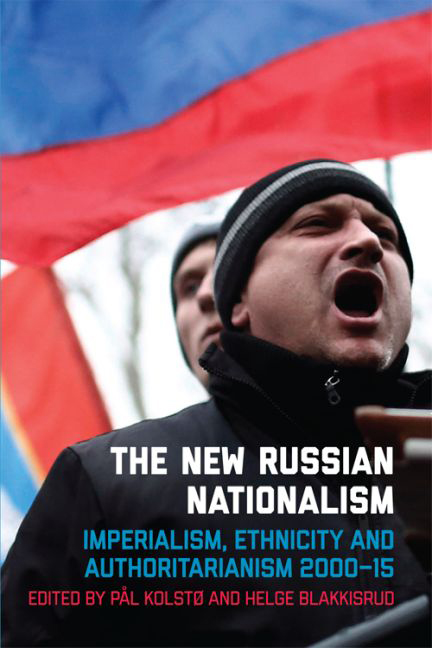Book contents
- Frontmatter
- Contents
- List of Figures
- List of Tables
- Acknowledgements
- Notes on Contributors
- Introduction: Russian nationalism is back – but precisely what does that mean?
- 1 The ethnification of Russian nationalism
- 2 The imperial syndrome and its influence on Russian nationalism
- 3 Radical nationalists from the start of Medvedev's presidency to the war in Donbas: True till death?
- 4 Russian ethnic nationalism and religion today
- 5 Everyday nationalism in Russia in European context: Moscow residents’ perceptions of ethnic minority migrants and migration
- 6 Backing the USSR 2.0: Russia's ethnic minorities and expansionist ethnic Russian nationalism
- 7 Rallying ’round the leader more than the flag: Changes in Russian nationalist public opinion 2013–14
- 8 How nationalism and machine politics mix in Russia
- 9 Blurring the boundary between civic and ethnic: The Kremlin's new approach to national identity under Putin's third term
- 10 Russia as an anti-liberal European civilisation
- 11 Ethnicity and nationhood on Russian state-aligned television: Contextualising geopolitical crisis
- 12 The place of economics in Russian national identity debates
- Bibliography
- Index
8 - How nationalism and machine politics mix in Russia
- Frontmatter
- Contents
- List of Figures
- List of Tables
- Acknowledgements
- Notes on Contributors
- Introduction: Russian nationalism is back – but precisely what does that mean?
- 1 The ethnification of Russian nationalism
- 2 The imperial syndrome and its influence on Russian nationalism
- 3 Radical nationalists from the start of Medvedev's presidency to the war in Donbas: True till death?
- 4 Russian ethnic nationalism and religion today
- 5 Everyday nationalism in Russia in European context: Moscow residents’ perceptions of ethnic minority migrants and migration
- 6 Backing the USSR 2.0: Russia's ethnic minorities and expansionist ethnic Russian nationalism
- 7 Rallying ’round the leader more than the flag: Changes in Russian nationalist public opinion 2013–14
- 8 How nationalism and machine politics mix in Russia
- 9 Blurring the boundary between civic and ethnic: The Kremlin's new approach to national identity under Putin's third term
- 10 Russia as an anti-liberal European civilisation
- 11 Ethnicity and nationhood on Russian state-aligned television: Contextualising geopolitical crisis
- 12 The place of economics in Russian national identity debates
- Bibliography
- Index
Summary
By some accounts, Russian politics is a realm of cynics, where everything is for sale, leaders rudely dismiss public opinion and politicians mainly pursue their own power and enrichment through a mix of repression and corruption (Gessen 2013; Dawisha 2014). In others, Russia's leadership is resolutely principled, driven at least in part by a nationalist goal of restoring Russian pride and recapturing the status and perhaps even the territory of the former USSR and Russian Empire before it (Aron 2008; Trenin 2014; Tsygankov 2014). If we assume that each perspective at least partly reflects at least some aspect of Russian politics, an interesting puzzle is framed. How precisely is it that these things fit together? In other words, how can a strong principle like nationalism play an important role in a political system where corruption is rife and elections are the preserve of the political machine?
The present chapter argues that we must understand the logic of what I have elsewhere called patronal presidentialism in order to explain how and why Russia's leadership is likely to be influenced by ideas like nationalism. Patronal presidentialism refers to a constitutionally strong presidency that exists in a particular social context, one in which political collective action takes place primarily through extensive networks of personal acquaintance, networks that tend to give presidents ‘informal’ power that extends far beyond the authority formally stipulated in the constitution. It turns out that even when such presidents use manipulation, coercion and fraud to win such elections, they run significant risks of losing power when they lose popular support. For this reason, presidents like those in Russia have been very sensitive to public opinion. Nationalism comes into play here.
The relationship between nationalism and political support in Russia is not straightforward, however, and for this reason the Kremlin has generally treaded very carefully on this issue. In fact, this chapter argues that President Vladimir Putin up until 2014 largely avoided making nationalism a central element of his popular appeal.
- Type
- Chapter
- Information
- The New Russian NationalismImperialism, Ethnicity and Authoritarianism 2000–2015, pp. 221 - 248Publisher: Edinburgh University PressPrint publication year: 2016



